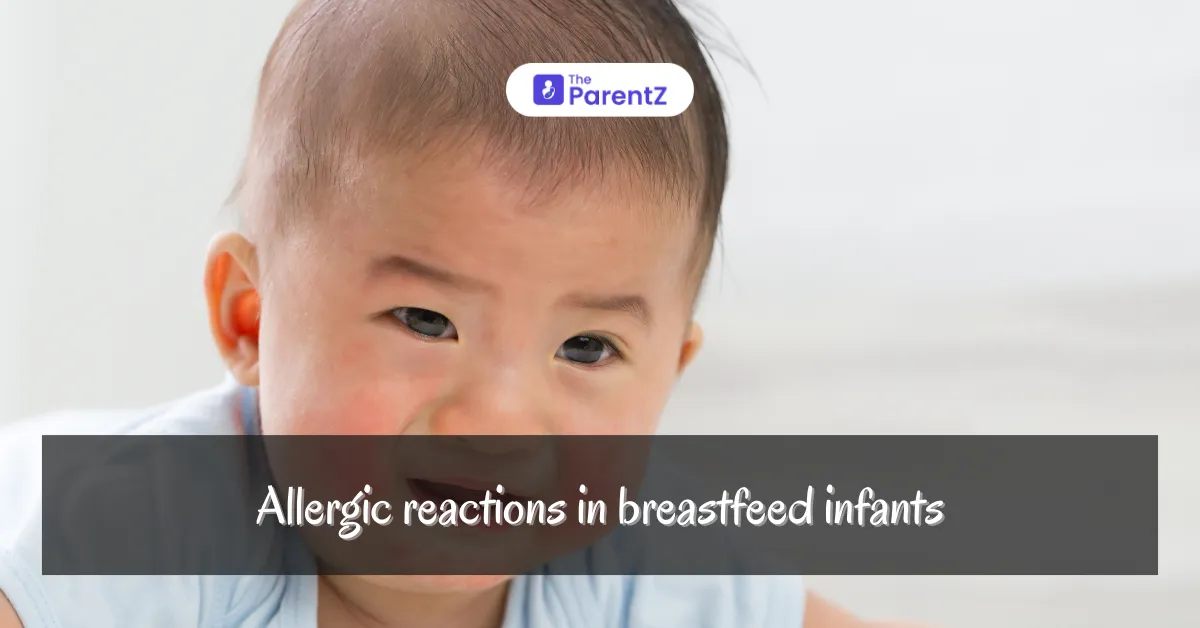What Causes Allergic Reactions in Breastfed Infants?
When a breastfeeding mother eats certain foods, proteins from these foods can pass into her breast milk. While most babies tolerate these proteins without issue, some may develop an allergy or sensitivity. Common allergens include:
1. Cow’s Milk Protein: One of the most frequent causes of allergies in breastfed infants. Proteins like casein and whey can be transferred into the breast milk.
2. Eggs: Egg proteins can also pass into breast milk, triggering allergic reactions in sensitive infants.
3. Peanuts and Tree Nuts: Although rare, peanuts and tree nuts may cause allergic reactions in infants.
4. Soy: Soy-based products, commonly consumed by mothers in plant-based diets, can sometimes cause allergic reactions in babies.
5. Wheat: Gluten proteins in wheat may cause sensitivity or allergic reactions in some infants.
6. Fish and Shellfish: Seafood is another potential allergen that can transfer to breast milk.
Symptoms of Allergic Reactions in Breastfed Infants
The symptoms of an allergic reaction in breastfed infants can vary, but common signs include:
1. Skin Reactions:
• Rash, hives, or eczema.
• Swelling, especially around the face or eyes.
2. Gastrointestinal Symptoms:
• Vomiting or diarrhea.
• Blood or mucus in the stool, often seen in milk protein allergies.
• Colic or excessive crying due to discomfort.
3. Respiratory Symptoms:
• Nasal congestion or runny nose.
• Coughing, wheezing, or shortness of breath (in more severe reactions).
4. Other Symptoms:
• Irritability or unusual fussiness.
• Poor weight gain or difficulty feeding due to gastrointestinal distress.
In more severe cases, an allergic reaction can lead to anaphylaxis, which is a life-threatening condition requiring immediate medical attention. Symptoms of anaphylaxis include difficulty breathing, swelling of the throat, and loss of consciousness.
Diagnosis of Allergic Reactions
If an infant shows signs of an allergic reaction, it is important to seek medical advice promptly. A pediatrician may recommend:
1. Elimination Diet: The mother may be asked to remove suspected allergens (like dairy, eggs, or peanuts) from her diet for several weeks to see if the infant’s symptoms improve.
2. Blood Tests: Blood tests can help identify specific allergies.
3. Skin Prick Test: In some cases, the pediatrician may recommend a skin test to check for sensitivities to common allergens.
4. Stool Tests: For suspected milk protein allergies, stool tests can help determine the presence of blood or abnormal proteins.
Managing Allergies in Breastfed Infants
1. Identify and Avoid Triggers
Once the allergen is identified, the most effective way to manage the allergy is to eliminate the food from the mother’s diet. For example:
• Cow’s Milk Protein Allergy: Mothers should avoid all dairy products, including milk, cheese, and yogurt, as well as foods containing milk-based ingredients (like casein or whey).
• Egg Allergy: Eliminate eggs and foods that contain egg products.
• Peanut/Tree Nut Allergy: Avoid peanuts, peanut butter, and foods that may contain traces of nuts.
2. Use Hypoallergenic Formula (If Needed)
In cases where breastfeeding alone does not resolve the issue or if the mother cannot avoid allergens entirely, a hypoallergenic formula may be recommended. These formulas contain proteins that are broken down into smaller parts, making them easier for sensitive infants to digest. However, breastfeeding is always the preferred option if it remains viable.
3. Monitor Baby’s Health
Regular follow-up visits with the pediatrician are essential to monitor the baby’s growth, development, and reaction to changes in the mother’s diet. If symptoms persist or worsen, additional interventions, such as medications, may be necessary.
4. Managing Severe Reactions
For infants with a history of severe allergic reactions, the pediatrician may prescribe an epinephrine auto-injector (EpiPen) to manage emergencies. Always have it on hand in case of an allergic reaction.
Prevention and Long-Term Management
1. Gradual Introduction of Foods: Once the baby starts solids (usually around 6 months), introduce potential allergens one at a time to monitor for reactions. This can help identify new food sensitivities or allergies.
2. Consider a Lactation Consultant: A lactation consultant can help mothers with dietary planning and managing food sensitivities to ensure proper nutrition.
3. Work with a Pediatric Allergist: In cases of complex or severe allergies, a pediatric allergist can provide specialized testing and treatment options.
Conclusion
Allergic reactions in breastfed infants, while concerning, can be effectively managed with careful monitoring, dietary changes, and professional support. Breast milk remains the optimal source of nutrition, and with appropriate adjustments to the mother’s diet, most babies can thrive. Always consult with a pediatrician if allergies are suspected to ensure the best outcomes for both mother and child.
Key Points
• Allergies in breastfed infants are often triggered by food proteins in the mother’s diet.
• Common allergens include cow’s milk, eggs, peanuts, tree nuts, soy, wheat, and fish.
• Symptoms of allergic reactions can include skin rashes, gastrointestinal distress, and respiratory issues.
• Elimination of the allergen from the mother’s diet is the most effective management strategy.
• Seek medical advice for diagnosis and long-term management of allergies.








Be the first one to comment on this story.